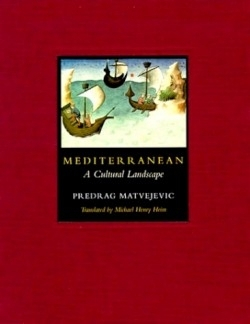
The Mediterranean
A Cultural Landscape
“Eclectic encyclopedia” best defines this wonderfully informative, digressive and evocative cultural history. Matvejevic, a Croat and university lecturer in Zagreb, Paris and Rome, is a cartographer of cultures; an analyst of arresting distinctions and details. His raw materials are the natural forces and human energies that have shaped the many civilizations that thrive or once thrived on Mediterranean shores and hinterlands. He draws on Greek, Roman, Byzantine and Muslim historians, scientists, merchants, travelers and men of religion—without neglecting their contemporary intellectual heirs; he moves beyond them to tap the little-known wealth of Croatian, Montenegrin, Serbian, Albanian, Maghrebian and even lesser known sources.
Though noting Fernand Braudel’s caution, “The history of the Mediterranean constitutes a mass of knowledge that defies all reasonable synthesis,” and recording his own use of “the works of inspired dilettantes,” Matvejevic offers readers a well-ordered book. It comprises a Breviary (a far-ranging survey and natural history); Maps (a narrative on classic exploration and cartography); and Glossary (digressions on previously treated and related topics). A magnificent range of interspersed historical maps and cityscapes enriches these sections.
Matvejevic brings the whole Mediterranean world to restless, pulsing life. Albanians, Copts, Istrians, Montenegrins and Vlachs join the expected Greek, Italian and Spaniard on the page. The relation of cities to the sea; the behavior of harbormasters; tales of sunken ports; the natural history of headlands, gulfs and capes leads on to practical navigation; distinctions among winds by type and by season; and to the movements and colors of surface water. Matvejevic discusses the growing of olives, grapes and figs and the making of oil, wine and vinegar; he digresses on wholesale, retail and women’s markets; he considers cliff-top prisons and lunatic asylums; he touches upon quarantine and lazarets. Mention of Discorides? Herbal leads him to Ibn al-Baytar’s Treatise on Medicinal Plants; and in an ichthyolexicographical aside he notes that the more useless a fish, the more names it sports.
One persistent thread in The Mediterranean is tongue-caressing, esoteric word lists. The reader is never far from the specialized vocabularies of ship-building, herb-naming, street-defining, wind-categorizing, etc. (try bura, burin, buraca, buraska or garbin, garbinada … ). Another thread is mind-teasing assertions (the vegetation in the [mid-Sahara] Hoggar Mountain wadi beds is undoubtedly Mediterranean; Spanish speakers define their relationship to the sea in the choice of gender they make (el mar/la mar); marsala (wine and shipping point) derive their name from mars (port) + Allah. The little-known source, the curious fact and telling detail enhance every page. Though it is a feast, approach this book as an endless array of intellectually succulent hors d?oeuvres. Eat slowly, return often—and note
the quality of the illustrations.
Reviewed by
Peter Skinner
Disclosure: This article is not an endorsement, but a review. The publisher of this book provided free copies of the book to have their book reviewed by a professional reviewer. No fee was paid by the publisher for this review. Foreword Reviews only recommends books that we love. Foreword Magazine, Inc. is disclosing this in accordance with the Federal Trade Commission’s 16 CFR, Part 255.
